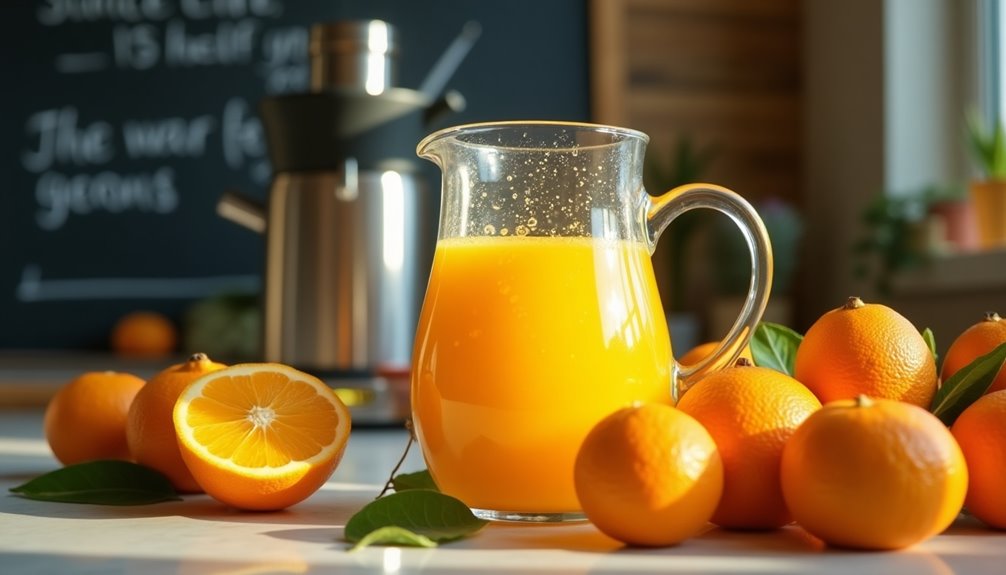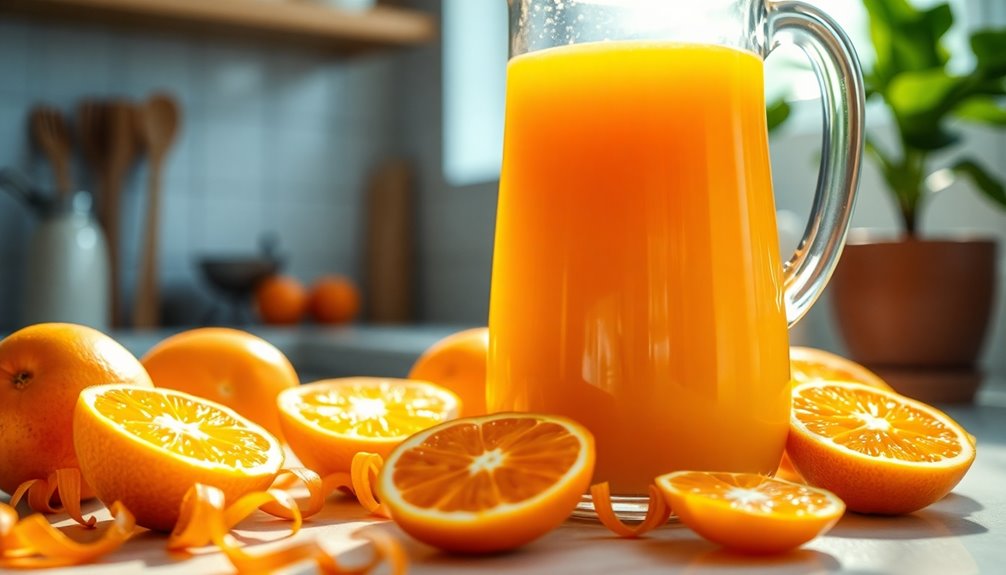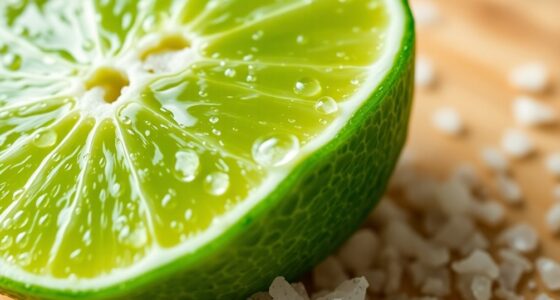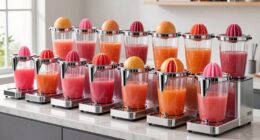Homemade orange juice is good for about 2 to 3 days when stored in the refrigerator. To keep it fresh, make sure to refrigerate it at 40°F (4°C) or lower and use an airtight container. If left out at room temperature, you should drink it within 2 hours. Always be aware of signs of spoilage, like off smells or unusual colors. Want to know how to extend its shelf life even further?
Key Takeaways
- Homemade orange juice lasts about 2 to 3 days when stored in the refrigerator at 40°F (4°C) or lower.
- For optimal freshness, store juice in an airtight container to limit oxygen exposure.
- Juice left at room temperature should be consumed within 2 hours to prevent spoilage.
- Freezing juice immediately after making it can extend its shelf life up to 6 months.
- Always check for off smells, unusual colors, or visible mold to identify spoiled juice.

When you make homemade orange juice, it's essential to know how long it stays fresh. Homemade orange juice typically lasts about 2 to 3 days when you store it in the refrigerator at 40°F (4°C) or lower. If you want to enjoy that refreshing taste later, keeping it cool is crucial. The refrigerator helps slow down the growth of bacteria and preserves the juice's vibrant flavor and nutritional benefits.
To make the most of your juice's freshness, consider placing it in an airtight container. This limits its exposure to oxygen, which can lead to spoilage.
When you leave homemade orange juice at room temperature, things change rapidly. It should be consumed within 2 hours to prevent spoilage. Warm temperatures create an ideal environment for bacteria to thrive, and you don't want to risk drinking juice that might've turned bad.
So, if you've left your juice out after squeezing, don't hesitate—consume it quickly to enjoy the taste and avoid any health risks.
One of the best ways to extend the shelf life of your homemade juice is freezing. If you freeze it right after making it, the juice can last up to 6 months. Just remember that once you thaw it, you should consume it immediately.
Freezing can change the texture slightly, but the flavor will still be delicious if you've stored it properly. Use an airtight container or freezer-safe bag to prevent freezer burn and maintain its quality.
To ensure you're drinking safe and tasty juice, keep an eye out for signs of spoilage. If you notice off smells, unusual colors, or even visible mold, it's time to discard the juice.
Spoiled juice won't just taste bad; it can also lead to stomach issues. If you're ever in doubt, it's better to err on the side of caution and throw it away than risk your health.
Frequently Asked Questions
Does Homemade Orange Juice Go Bad?
Yes, homemade orange juice can go bad. If you leave it out at room temperature, it may spoil in just a couple of hours due to bacteria growth.
In the fridge, it typically lasts about 2 to 3 days. Keep an eye out for signs like an off smell, unusual color, or separation.
To keep it fresh longer, store it in airtight containers and consider freezing it for up to 6 months.
Can You Drink Orange Juice 7 Days After Opening?
You shouldn't drink orange juice 7 days after opening it. By that time, the risk of spoilage increases significantly.
Even if it's been refrigerated, signs like off odors or strange colors can appear, indicating it's no longer safe.
Freshly squeezed juice can spoil quickly, so it's best to consume it within a few days.
If you're unsure, trust your senses—if it smells or looks off, it's better to toss it out.
How Long Will Homemade Juice Last in the Fridge?
When you make homemade juice, it typically lasts about 2 to 3 days in the fridge if you store it in an airtight container. To maximize the freshness and flavor of your homemade juice, it’s best to consume it as soon as possible. Additionally, certain juices, like those made from apples, are often touted for their potential benefits, such as apple juice and constipation relief. Including a variety of fruits and vegetables in your juices can also enhance their nutritional value and provide a broader range of health benefits.
You'll want to consume it as soon as possible for the best flavor and freshness.
Check for signs of spoilage like off smells or unusual colors.
Always refrigerate your juice immediately to slow down spoilage and keep those nutrients intact.
Enjoy your fresh juice while it's at its best!
Is Orange Juice Good After 10 Days?
Did you know that bacteria can double in number every 20 minutes at room temperature?
When it comes to homemade orange juice, you shouldn't drink it after 10 days. After this time, it's likely gone bad, showing signs like off odors or unusual color.
Even if it's been refrigerated, the quality deteriorates significantly, making it unsafe.
To stay safe, stick to drinking it within the first few days of making it.
Conclusion
In conclusion, homemade orange juice is typically good for about 2 to 3 days in the fridge. To keep it fresh, store it in an airtight container. Imagine you've just whipped up a batch for a weekend brunch. If you're not finishing it all, you can enjoy a refreshing glass on Monday morning, brightening up your day with that zesty flavor. Just remember, the sooner you drink it, the better the taste!
Cindy thoroughly researches juicing trends, techniques, and recipes to provide readers with practical advice and inspiration. Her writing style is accessible, engaging, and designed to make complex concepts easy to understand. Cindy’s dedication to promoting the advantages of juicing shines through her work, empowering readers to make positive changes in their lives through the simple act of juicing.











